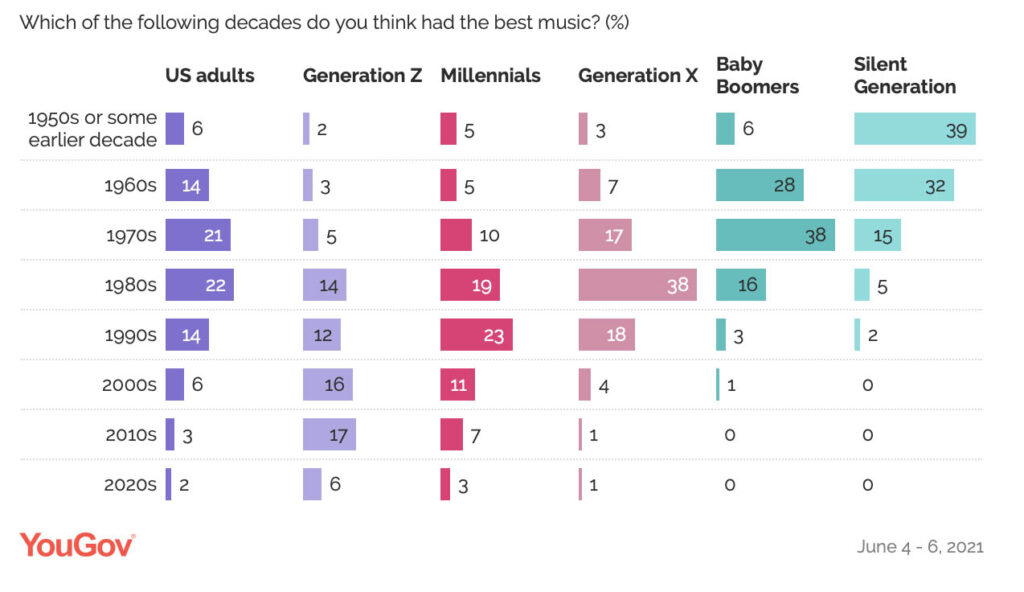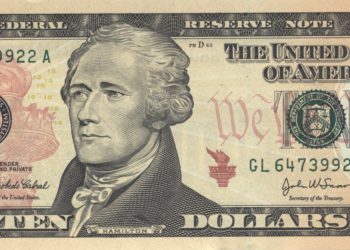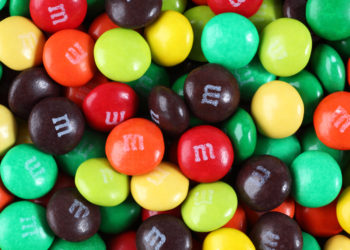It’s been a musical week in our household, and I’ve spent a significant amount of time being schooled in the history and nuance of the Kendrick Lamar, Drake, and J. Cole feud (here’s a primer for those out of the loop). I very conveniently had access to a teenager to help all of this make sense, and apparently that is key, at least according to a deep dive I ran across that digs into why we stop listening to new music as we get older.
Daniel Parris was inspired to understand why Spotify’s algorithms fed him music from such a limited period. The literature suggests that what we listen to between the years of 13 to 16 is formative for our musical tastes. This bias reaches across all generations, at least according to a YouGov survey on which decade’s music was best (figure below).
Other studies suggest that music discovery peaks around age 24, and that stagnation sets in one’s early 30s. As one ages, less and less time and energy can be devoted to seeking out new music, music plays a different role in the lives of adults than it does for adolescents. Parris goes on to suggest that we reach a point where the “explore-exploit” payoff tips more toward exploit, once you’ve established what you know that you like.
In an algorithmic age, it has been fascinating to see how that teenager mentioned above has developed their own musical tastes. While much has changed since my day, the main route to discovery remains the same — you learn about new music from the people around you, and listen to what your friends are listening to.
And as your friend, I’ll recommend the song that’s been stuck in my head for recent weeks, a favorite from 2023 below. Have a good weekend.
Discussion
23 Thoughts on "Music Paralysis as We Age"
I enjoy listening and discovering new music, but it has to be good! I’m biased though, because I’m a classically trained musician, so I’m extra picky when it comes to good melodies, harmonies, and if the music tell a good melodic story (either simple or complex). Some of the surprising new sources of quality music I can be find are on video games or anime sound tracks. I like turning on the AI DJ on Spotify. The algorithms aren’t bad, but sometimes I wonder about the Editor’s Picks, sometimes I listen to the entire track, sometimes I fast forward wondering “what were they thinking?” I also make a point to listed to Release Radar every Friday afternoon on Spotify.
Thanks, David. This was a fun read. I was stuck in a music hole for a bit and found myself not exploring music like I used to when I was young. A friend and coworker turned me on to a project he started with friends during the pandemic: 1001 albums to listen to before you die (https://1001albumsgenerator.com). I highly recommend it! The main idea is you get some folks together and create a listening group. Each day you are served up the same album and everyone listens to on their own and then you write a review and rate the album. It’s really exposed me to genres I would not have sought out on my own (rap, heavy metal) and introduced me to the classics I never got around to really exploring (Coltrane, Sinatra). It’s a commitment … a multi-year project. It also messes up your Spotify stats if that’s something you are trying to maintain (I’ve dropped from top 2% Swiftie to top 3%). But it’s such a joy to have something new to explore even if you absolutely hate the album of the day (see Motörhead No Sleep Till Hammersmith) you continuously learn something new (I seem to be a Limp Bizkit fan…would never have seen that coming). I just hit album 400 and now I’ve got to go have a listen to Tim Buckley…Goodbye and Hello!
I absolutely love Motörhead No Sleep Till Hammersmith, deluxe edition!
Hah! Apparently many people share your love. Felt like one long headbang to me. I would never have listened to the album on my own so I am grateful to say I’m familiar with the album and can now answer the question of where one might not fall asleep first — Hammersmith or Brooklyn.
Always reminds me of “The Young Ones” https://www.youtube.com/watch?v=wR3xwENK7Jo
certified banger shared [question mark]
My favorite decade? Quite possibly the ’40s, by which I mean the 1740s, Bach’s last decade. As for this: “As one ages, less and less time and energy can be devoted to seeking out new music, music plays a different role in the lives of adults than it does for adolescents” — let me urge readers to check out NJ radio station WFMU, which in addition to an FCC-regulated broadcast stream features three Web-only streams. No effort required to get exposure to all manner of new musics.
I disagree with much of this research. Maybe some people stagnate, or play it safe by sticking with an era they know well and which holds memories. As for Spotify, it will only suggest music based on what you listen to, so it’s a vicious circle. But if you value good music, you are always seeking and discovering new sounds. I’m Generation X, and the music I listened to this week, according to Spotify, was from the 1960s, 70s, 90s, 2010s, 2020s, and 16th Century!
Agreed and Gen X as well! My stations are all over the place, just a sampling: Gustav Mahler Radio, Hair Metal: Best Hits, Industrial Synthwave Metal, Gary Newman, Johann Sebastian Bach Radio, Led Zeppelin Radio, (and about 60 more stations?)
Synthwave! Even though I comment in another part of the thread that I am primarily happiest listening to 70s/80s/90s as a Gen Xer, the Synthwave trend, in all of its variations, is so much fun. It brings the Gen X memories, but some of the artists add their own modernized flair, which I also enjoy.
I might separate out “disagreeing” with the research from being an outlier, one for whom the patterns aren’t accurate. I’m with you on that, and in writing, was thinking about how much my seeking behaviors have evolved over the years. I do miss the serendipity of a well-curated record store and back in the day was heavily reliant upon the distant press to bring information of new things to my backwater hometown (Trouser Press just put out a lovely compendium of their long extinct magazine https://www.trouserpressbooks.com/zip-it-up).
I absolutely love this topic. I love all music and always have, but I can look back and see that it was in my early 30s that music discovery stopped – at least at scale – for me. I was a busy mother working full time in an exciting career in scholarly publishing, and at the time I didn’t pay any attention because, quite frankly, the music in my life was all variations on “the wheels on the bus go round and round.”
As a woman of a certain age [cough], with an empty nest, I have time to myself again but when I listen to music from the 70s, 80s and 90s, I am the most happy. It ties back into the faded memories of emotions and experiences of my youth, and the research that has been done on this topic resonates with me.
Parenthood, along with employment, is cited as a reason why one’s seeking behavior falls off. I used to be really good at Trivial Pursuit, but now there’s a decade or so hole in my pop culture knowledge, where all I really know about from that time period is the great children’s music put out by They Might Be Giants.
I assume that when Tim says he “disagrees” with the research he just means there are exceptions, not that the research itself is flawed. There are always outliers. But no matter — in my case, at 67, I continue to listen to a very wide range. But I was a music major for a while in college and I’ve been in bands and a solo performer for most of my adult life. Music plays a much more important role in my life than for most people, so I know I’m an outlier. I don’t use Spotify, so I don’t fall victim to their algorithms. These days I tend to listen to 6 or 7 albums in rotation, dropping one out and adding another in after two or three or four or five plays depending on how it grabs me. At the moment they include the new Kamasi Washington and St. Vincent albums, a Steeleye Span collaboration with Terry Pratchett from 2013 that I just found out about, the Allman Brothers first album, Ian Anderson’s Thick as a Brick 2, a new agey album by Phil Sheeran from 1991, Global a Go-Go by Joe Strummer and the Mescaleros, and a wonderful classical violin album by Cecilia Ziano called Waiting for Paganini. Two weeks ago the list would’ve been heavier on late 19th & early 20th century classical and acoustic jazz from the 2nd half of the 20th century. What I find particularly noteworthy about the chart is how GenZ ‘s tastes fall across a wider spread than previous generations. This makes sense because they’re the first generation to have full easy access to the entire history of recorded music. If you’re 20, music from the 80s is just as accessible as music being released now. It’s all contemporary and you start to hear it and judge it differently. I’ve seen occasional essays claiming that this interest in “older” music (i.e., older than two years) is a sign that music being produced now just isn’t as good as older music (Ted Gioia did a particularly egregious piece along these lines a while back), but this is nonsense. With so much more music so easily available it stands to reason that young people, in those very formative teenage years, would be doing more listening across a broader timespan than previous generations. I include a section on this in my recent substack essay, Gutenberg in the Whirlwind.(https://heyscott.substack.com/p/gutenberg-in-the-whirlwind )
Oh that new St. Vincent is so good!
There’s also an interesting theory about why more current generations show that spread in listening habits, and the end of culture in general. I’ve tried to wrap my head around it a couple of times in these pages:
https://scholarlykitchen.sspnet.org/2015/12/24/greetings-from-the-age-of-abundance/
https://scholarlykitchen.sspnet.org/2010/02/25/the-internets-extended-cultural-memory-is-it-sapping-our-creativity/
Think about music — what was the last big national (or international) trend/movement in pop music? Grunge (1990s, more than 30 years ago)? Boy bands (same)? One theory is that where a local scene (Athens GA, Seattle) would have time to percolate and develop before it was noticed, the internet now exposes such activities as soon as they start, essentially altering them before they can become what they were going to become (as many have stated, punk rock died as soon as people outside of lower Manhattan heard about punk rock).
Another theory, mentioned in the posts above, is that the pace of life and the quantity of information we face on a daily basis have so overwhelmed us that we seek comfort in the familiar rather than having the capacity to work through something new (hence all the movie sequels rather than new creations).
I’m still not sure why things have slowed so much culturally. But given the teenager above, some of the attention has shifted to the world of video games, where truly groundbreaking work continues to happen, but the music of interest is a combination of 1990s grunge and the aforementioned hip hop artists who are all pushing 40. New bands are part of the mix, but they’re all playing in well-established genres.
I don’t think that the lack of a movement or trend for the past 30 years is a sign of slackening creativity, especially as movements are often as much a packaging job by labels as they are expressions of a scene’s aesthetic. Scenes, in turn, can be pretty eclectic–the Ramones are a very different band than Talking Heads, The Apples in Stereo don’t sound anything like Neutral Milk Hotel.
Just as today’s listeners have the entire history of recorded music to draw from, so do today’s artists. My new favorite artist, P’tit Belliveau, moves easily through pop, metal, bluegrass, hip hop, and country, all while singing in redneck Acadian French. Critically, whatever the genre, the music is unmistakably his, something new. The youth today don’t need to put on these different genres; they own them.
Maybe — as I wrote back in 2015, we live in an age of abundance, and that certainly does change the way we create (not that it diminishes it, but it does make it different):
https://scholarlykitchen.sspnet.org/2015/12/24/greetings-from-the-age-of-abundance/
There may be something there — we have so much to get through that we live a more scattered existence, songs on shuffle rather than full albums, no time for a coherent scene or genre to develop as our current culture has us hopping around from spot to spot.
There’s also something about the way our media has changed, and how we no longer have shared experiences the way we once did when there were fewer choices. I wrote about this here:
https://scholarlykitchen.sspnet.org/2019/12/13/a-rare-shared-cultural-experience-and-the-value-of-inconvenience/
“[W]hat was the last big national (or international) trend/movement in pop music?”
K-pop is late ’90s, early ’00s and beyond. Oakland (so, not even national) had hyphy at the same time, but no more to my knowledge. New prog?
Thank you for your take on punk rock. I myself have a hard time hearing post-’79 punk as punk, even though I enjoy some of it.
I’m commenting a lot here, but this is a topic near and dear to my heart and ears.
Last week I attended an event on campus featuring one of the campus a capella vocal groups. They performed Whitney Houston’s “I Wanna Dance With Somebody to Love,” which tickled me, because I purchased the 12″ single of it in ’87, when it was released. I proclaim it the best song of that year. Whatever. After the performance, I thanked the group and remarked that none of them were close to being born when it emerged. One of the students remarked, “Music transcends generations.” Bravo.
Fascinating! Good to see a strong showing for the 80s as the best decade across the generations, which is the correct answer of course.
I’m in my late 30s and I’m discovering more new music now than I have for a long time, probably since my mid 20s, and it’s thanks to how easy it is now (thanks to Spotify). We’re at a great time for that. To be honest, I’d be tempted to say these stats are less about discovery per se and more about the time one spends with music, and the emotional development you’re going through at the time. I’ll always love (most of) the music from my teens best because in those days I spent hours and hours with each album. It’s why people who grew up with pop punk and nu metal often still love it as adults even though it’s objectively the worst.
Okay, now the commenters here have inspired me to do some self-reflection. In 2022, I reconnected with an old friend I hadn’t spoken with for nearly 40 years, and they asked me to send a couple playlists of my favorite music so they could catch up on what they’d might have missed. Looking at the two CD-length playlists, 40 songs total, it breaks down as follows:
1960s 7.5%
1970s 10%
1980s 10%
1990s 20%
2000s 27.5%
2010s 20%
2020s 5%
Given that I’m an early Gen-Xer, I should be much more rooted in the late 1970s, early 1980s, but as it turns out, I seem to have a preference for the 1990s, 2000s, and 2010s. Perhaps this represents my stunted development, or my outlier status as still being interested.
So it seems that those of us who really love music are in the minority!
We also shouldn’t forget the impact of the music our parent’s played to us as a kid. I’ve got an entire playlist on my spotify which is just “songs I used to listen to with mum and dad”, there are entire bands and genres I wouldn’t’ve really engaged with if mum and dad hadn’t played them when I was a kid, and they do have a special place in my heart. So the 00s and 10s have had the most impact on me, cus that’s when I grew up, but close behind is the 80s cus that’s the music that my parents listened to




